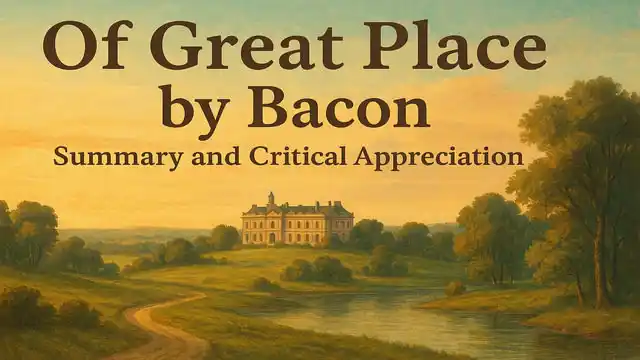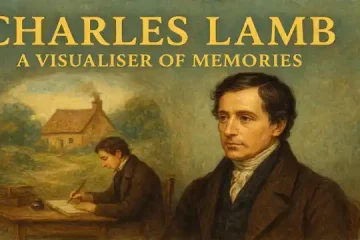Introduction of the Essay “Of Great Place”:
Francis Bacon is celebrated for his worldly wisdom, and his essays are a treasure of guidance for all—from ordinary citizens to rulers, kings, and princes. Though he has often been criticized for advocating material success by any means, fair or foul—earning from Pope the remark that he was “the wisest and the meanest of mankind”—in “Of Great Place,” he offers sound and thoughtful advice to those who hold positions of authority or aspire to them.
The lessons he presents are practical and point towards assured success, reflecting not only his vast learning but also his keen insight into the realities of life. However, it is noteworthy that while Bacon instructs others with clarity, he seldom applied these principles in his own conduct. In the essay “Of Great Place,” as he addresses those in positions of power, he carefully explains both the paths they should follow and the pitfalls they must avoid to succeed.
Summary of the Essay “Of Great Place”:
The Bondage of High Office:
Men who hold posts of trust and responsibility are servants in to the duties of the post. They are always in bondage and have no freedom of will. They also to take into consideration their reputation and they have to devote themselves entirely three different ways. They have to obey and carry out the orders of their King. They have neither freedom of movement nor freedom of leisure. They are slaves to work. All their time is given to the duties of their high post. When a man holds a post of responsibility, he enjoys and holds it even if he has to throw away his own personal freedom.
The Labour and Uncertainty of High Position:
A man has to put hard work and labour in order to attain a high position because every high position involves heavy responsibility. The higher the post, the greater is the work and humiliation to secure it. Even when a man has secured high office, it remains uncertain as to how long he would be able to hold it. A person who holds a high place is likely to suffer a downfall in two ways. The King may be displeased and he may lose his power and authority. Some other person may acquire favour in the eyes of the King and he may suffer a temporary loss of power. This loss of influence and power may be either permanent or temporary; it would cause great suffering and misery to the person concerned. Not only this, the men who hold high offices cannot always follow their own inclinations.
The Illusion of Happiness in High Places:
When it is proper for them to give up their office and retire, they are not able to do so. Such people are scorned and ridiculed by others. People holding high places are not really happy but others think that they must be happy. If they search their own heart and soul, they will find no happiness within. Their happiness springs not from within but from the reports from others. But great men blinded by their own power never become conscious of their own faults and weaknesses. They are so busy in the duties of their high office that they have no time to understand their own faults. Bacon has given a quotation from Seneca to prove his point of view.
The Power to Do Good or Evil:
In a high office a person has the freedom to do good as well as evil. To do evil is indeed the bane of life: The holder of high office should do only good for evil actions are a sin, wickedness and wicked people are cursed. The best would be not to have a desire to do evil or he must not be allowed to hold high office. A high office gives one the power to do good so it is quite proper to use the power for doing good to others.
Virtue as the True Aim of Life:
Good thoughts cannot be translated into good actions until a person is placed in a position of advantage and power. It is just like the troops occupying a high position have an advantage over their enemy. The aim of man’s life is to be virtuous and do good deeds and the consciousness of having performed good actions entitles a man to the enjoyment of rest. God created the universe in six days and took rest on the seventh day. God felt happy on seeing the universe. Similarly man is also entitled to rest and happiness if he performs good work.
Learning from Examples:
The people in high position should keep before themselves the best examples of conduct and imitate them. One can easily form a body of rules and principles for one’s guidance from the example of the past. After sometime he should compare his past conduct with his present one, only then he can judge whether he has improved. He should also keep example before him of those who did not discharge their duties well. Their failure should serve as a warning but in this way he should not show off his superiority but he should reform himself without speaking ill of his predecessors.
Following Rules with Wisdom:
A man of high position should follow the good examples and should try to understand the rules. Seeking advice both from the past and the future is useful. The holder of a high office should try to be directed and controlled by rules but he should not be dogmatic. He should give sound reasons if ever he deviates from them. He should exercise the rights of his high office without discussing whether they are legal or not. He should exercise them silently. He should also protect and safeguard the rights of the subordinates and should give them direction on important matters. He should welcome and invite guidance regarding his duties of his high place instead of turning away those people who bring information as interfering persons. He should accept that part of the information which may be useful for him.
Vices of High Office:
There are four vices of which a man in high place may be guilty. These faults are delay, corruption roughness and facility. A man in high office should be easily approachable. The evil of bribery among the subordinates can be remedied in this way. He should meet them at the fixed time. The work which has been taken up must be completed promptly. Two works should not be mixed up unless it is most necessary. He should restrain himself from taking bribe but it is not enough. People should be checked from offering bribes because bribes can tempt even the most honest officer. It will check the subordinates from accepting bribes . He should act in such a way that no one may even suspect his honesty.
The Need for Justice and Impartiality:
If a high placed officer changes rules, he should give proper reasons for this change. He should not change secretly. If a servant becomes very close to his officer, without any reason, it will encourage others to offer bribes. He should not be rude because it will unnecessarily create resentment among the subordinates. Severity creates fear in the heart of others but rudeness creates hatred. He should not allow himself to be guided by petty considerations. King Solomon said that it is not proper for a superior officer to be influenced by personal considerations. He should not give undue favour to anybody otherwise there is danger that he may act wrongly and break the law for unimportant things.
High Office Reveals True Worth:
What Bias said in old times is absolutely correct that a high office only reveals the true worth of a man. The noble men show their virtues while the faults of others are exposed. Tacitus says about Galba that everyone would have thought him worthy of the throne if he had never actually reigned. If a man improves on coming to a high office, it is a sure sign that he has a noble mind.
Virtue as the Basis of True Honour:
Only the virtuous men should occupy the office of honour and prestige. In nature things move with violent movement till they reach their proper place and then they become normal. Similarly men in power act restlessly to realise their ambitions but as soon as they reach their proper place, their virtue reveals itself.
Conduct in Public and Private Life:
The rising to a high place is a very difficult and intricate process so while struggling to a high place, one should join a group or party. But when he has attained that office, he should be impartial. A man in high position should talk about his predecessors justly and with due respect. If he is disrespectful, his successors will talk about him in the same way. It is better to call the colleagues for conversation than refuse to meet them. He should be careful when he is talking even in private life. When in high office, his behaviour should be quite different and dignified from his behaviour in private life.
Critical Appreciation of the Essay:
Introduction:
Like many of Bacon’s well-known essays, “Of Great Place” is rich with practical wisdom and worldly insight. The essay “Of Great Place” stands out for the depth of experience Bacon conveys in an orderly and systematic way. True to his style, Bacon begins with a broad, general statement and then explores it from different angles—examining advantages, disadvantages, challenges, and other related aspects. He follows this same method here. Broadly speaking, the essay “Of Great Place” can be divided into four sections: the drawbacks of high office, the benefits of power and authority, the conduct expected of those in great position, and the pitfalls they should avoid. He also suggests how one may rise to such a position and what strategies are useful in doing so.
Although concise, the essay “Of Great Place” embraces every important dimension of a man in authority—both the one who already holds office and the one who aspires to it. It examines him partly in his private dealings with himself and partly in his public role within society. Bacon’s analysis is both comprehensive and precise, supported by practical advice, examples, and his wide-ranging knowledge. His remarks on men of high station are particularly noteworthy: while he urges the adoption of honest practices, he does not entirely reject the use of less virtuous methods. The essay “Of Great Place” thus combines guidance with caution. At the same time, it sheds light on human nature itself, making it deeply insightful. Many of Bacon’s sentences read like memorable maxims, easily recalled by readers.
The Moral Tone:
In this essay “Of Great Place,” Bacon seems to speak from the culprit, like a priest or a teacher imparting lessons of morality and honesty. He warns against the dangers of high position and advises that the authority should be used for the good of the people. He says, “In places there is licence to do good and evil … But power to do good is the true and lawful end of aspiring.” He advises to do only good because evil and wicked actions are sin and sin means damnation. The best way is that the man in high position should have no desire to do evil. Even if he cannot control his tendency to do evil, he should not have the desire for that high position.
Thus, Bacon tells that men in high position have power and they should never misuse that power. Another moralistic tone is realised in his advice to be impartial and that a man in high position should not give particular favour to any of his subordinates. The danger is that it will create suspicion about his honesty. Bacon’s advice to abstain from accepting bribe is also quite moralistic. He tells that a man in high position should neither accept bribes nor should give it. If he maintains his honesty, his subordinates will also be afraid of adopting these methods.
A Worldly Wise Man:
Bacon’s guidance is always based on his practical experiences. He was himself placed in very high position and knew well that such a man has to bear so many great responsibilities. He warns such a great man to be impartial and to deal with all his subordinates equally. As a worldly wise man, he teaches the lesson that such a man should seek advice from his predecessors. It is bad to criticise them or to talk about them humiliatingly. He must see their good and bad characteristics. The good things will serve as a guiding principle and will take advantage from them for his own success. But if any predecessor had failed, it is bad to ridicule him still he must not follow their weaknesses and should make every effort to avoid them in his own activities.
Moreover, if he laughs upon his predecessors, the next coming man will also in the same way criticise him, humiliate him and ridicule him. As a man of worldly wisdom, Bacon very well knows the various difficulties that a man has to face while aspiring for a high position. Such a man is very violent in his activities and works hard, but once he has gained it, he becomes quite silent and orderly. He tells that a man in high position has to work very hard, his duties always keep him busy so he has no time spare for his own physical or mental health. He should also be careful against recommendations because if once he yields to them, it will become quite common with him and he will be in difficulty.
Practicability:
It is wrong to consider Bacon a moralist, though undoubtedly he is a worldly wise man. His first consideration in life is to rise and for this, as a practical man, he allows to adopt every possible way, unmindful whether it is right or wrong. Here he tells that in order to get a high place, man has to adopt crooked ways. He must join one or the other party to support him in his progress but then he becomes ungrateful. Indirectly he hints that when he has attained that place he should not give special favour to anybody. It means that after gaining the personal end, he should forget his supporters. It is quite as he himself had done in his life.
The Realism:
Bacon is quite realistic in all his remarks whether he advises them or warns them against some dangers. He says that they should follow good examples and thus present useful precepts before others. They should not speak ill of their predecessors and be regular and impartial in their behaviour with their subordinates. They should save themselves from bribes and maintain an uncontroversial position. All these are quite realistic experiences of the life of Bacon himself as a man in high position. His remarks in the concluding paragraph are very illuminating and valuable when he guides those who are aspiring for a high position. He tells what way to adopt but also advises that they should change their behaviour. This realistic advice is very useful because on the one hand we learn the way and on the other hand he guides us to get honour and respect and thus keep the position longer.
Bacon the Man:
The essay “Of Great Place” reveals Bacon as a man of great scholarship. He looks to be a true product of Renaissance. He was steeped in Biblical scholarship and ancient mythology as well. As such these allusions are often seen in his essays. He refers to the reference from Bible that God created the universe for six days. Looking back at His own creation, He was satisfied and took complete rest on the seventh. Similarly he has employed the sayings of wise Solomon which support his point of view from place to place. His analytical intellect has been perfectly revealed. He was a shrewd and practical man which quality is quite obvious in this essay also. The practical considerations take precedence over moral or spiritual considerations. He is everywhere systematic, logical and convincing and reveals him as a man of versatile genius.
Typical Baconian Style:
The style adopted in this essay is aphoristic and there are maxims like sentences. The essay begins with a remark “Men in great place are thrice servants.” This style is frequently seen in many of his essays. At places Bacon has adopted a tone of superior confidence. The thoughts and ideas contained in this essay make it impressive and useful. As usual, the essay “Of Great Place” presents the pros and cons of the problem and Bacon tries to put the reader in possession of all that can be said on the subject. There is throughout simplicity and clarity of expression in the essay. Though the sentences are typically terse and loaded with compressed meanings, there is no obscurity and the ideas have been presented in an easy style. It is an example of Bacon’s characteristic style. Various Latin quotations have been used. There are allusions to Tacitus and Galba that add to the interest of the essay. The use of metaphors helps in elaborating the idea. The condensation, compression and economy are the most striking features which make the essay epigrammatic.




